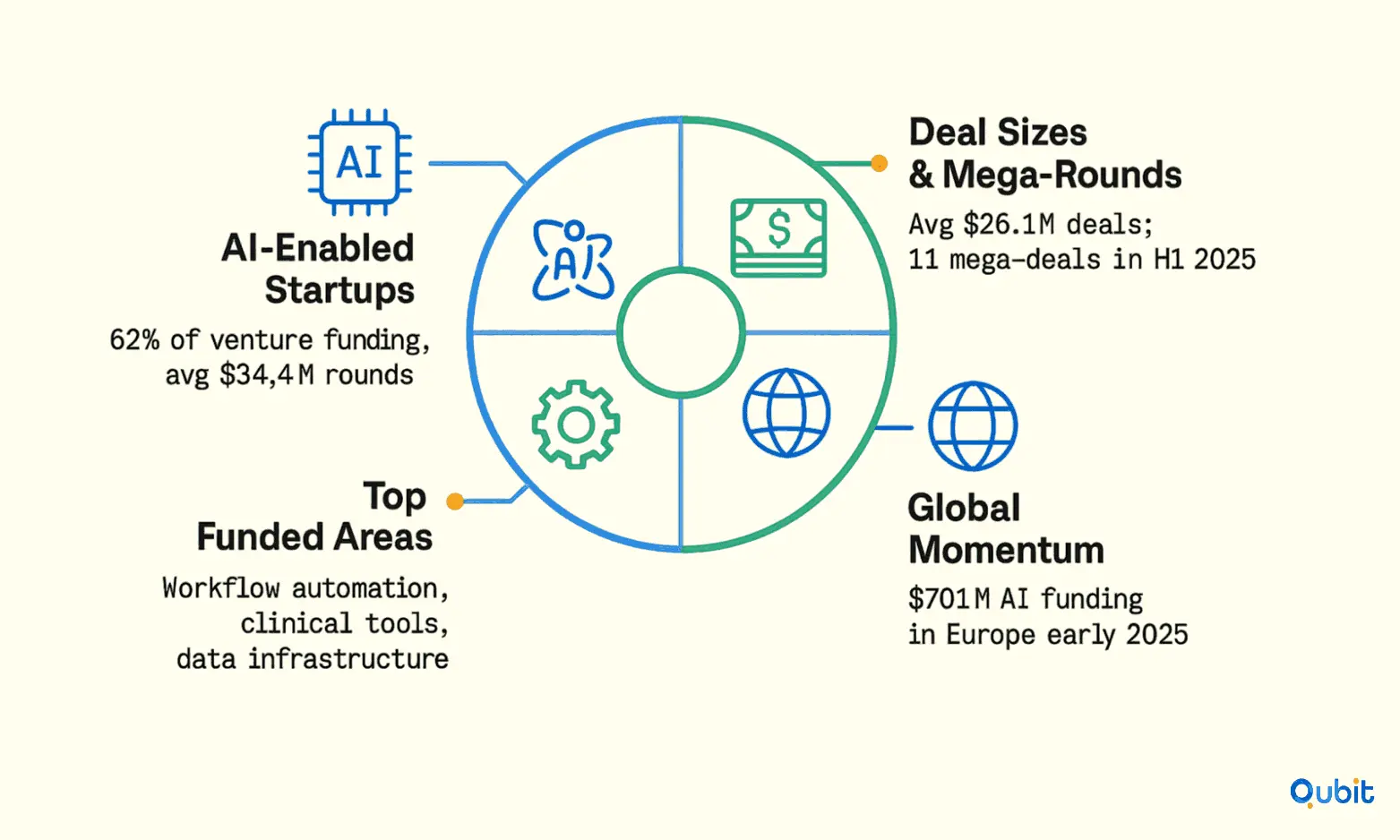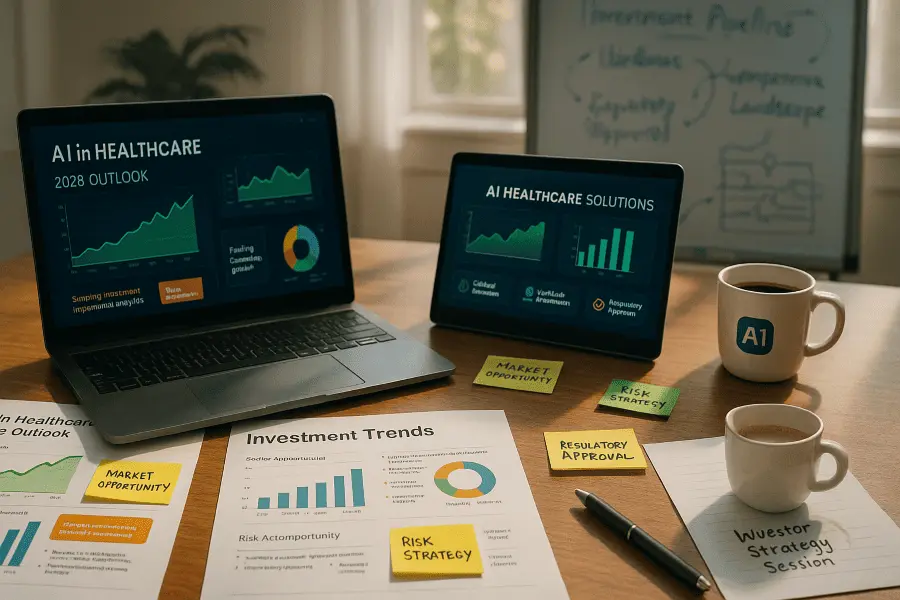Artificial intelligence is reshaping the healthcare industry, driving innovation and attracting significant investment. From predictive analytics to personalized medicine, AI applications are revolutionizing patient care and operational efficiency. Investors are increasingly drawn to the sector’s potential for high returns and transformative impact, making it a focal point for funding activity.
Your exploration of AI investment trends builds on foundational strategies described in how to secure funding for healthcare startups, providing context for overall financing approaches. This connection highlights the importance of understanding broader funding strategies before diving into AI-specific opportunities.
Let’s delve into the current trends shaping AI investments in healthcare and uncover the transformative potential of this rapidly evolving field.
AI Investment Trends and Opportunities
The healthcare sector is witnessing a transformative wave of AI investments, driven by promising returns and expanding market opportunities. Recent data highlights the global AI in healthcare market size, which reached USD 26.69 billion in 2024 and is projected to soar to USD 613.81 billion by 2034, as reported by Precedence Research. This exponential growth underscores the vast potential of AI-driven solutions in both clinical and non-clinical applications.

Key Funding Trends
- AI-Enabled Startups Dominate Funding:
In the first half of 2025, AI-enabled healthcare startups captured 62% of all digital health venture funding in the US, raising an average of $34.4 million per round—an 83% premium over non-AI startups. The top three funded areas were non-clinical workflow automation, clinical workflow tools, and data infrastructure, all being rapidly transformed by AI. - Deal Size and Stage:
While the total number of deals has slightly declined, average deal size has increased (to $26.1M), with later-stage (Series B-D1) AI startups seeing the largest rounds. Eleven mega-deals (over $100M) were recorded in H1 2025—nine of which went to AI-enabled companies. - Global Momentum:
European digital health startups deploying AI raised $701 million in early 2025 alone. Over 70% of large hospital systems worldwide now use AI in at least one clinical domain, such as radiology, pathology, or cardiology
Imaging AI vs. Clinical Decision-Support Technologies
Imaging AI technologies are advancing at a faster pace compared to clinical decision-support systems. While imaging AI demonstrates quicker adoption and maturation, clinical decision-support tools face longer development cycles due to complex regulatory hurdles and integration challenges. Healthcare stakeholders must carefully evaluate these dynamics to identify strategic investment opportunities that align with their goals.
Growing Investor Interest Across Applications
Investor enthusiasm is expanding beyond clinical solutions to include non-clinical applications such as operational efficiency tools and patient engagement platforms. Market insights into digital health are further enhanced by trends highlighted in the telehealth funding outlook, which offers a focused perspective on sector-specific investments. This diversification reflects the broader recognition of AI's ability to optimize healthcare delivery across multiple dimensions.
Supporting Data Integration
Effective AI adoption often hinges on robust data-sharing frameworks. Explore how financial models for health data interoperability funding can underpin AI analytics by addressing integration challenges. This resource examines investment strategies that enhance data flow, ensuring AI outputs are both accurate and actionable.
Sector and Investor Dynamics
- Generative AI: The generative AI healthcare market is projected to reach $2.7 billion in 2025, with forecasts of nearly $17 billion by 2034
- VC and Institutional Focus:
AI’s share of sector-focused venture funds has surged, reaching 24.5% of all new VC fund allocations in 2025—up from just 5.4% in 2022. Healthcare and AI together account for a significant portion of new fund activity, reflecting deep investor confidence in the returns and scalability of AI-driven solutions. - Top Investment Areas:
- Patient Engagement & Clinical Decision Support: AI tools for patient communication, triage, and decision support are attracting both early- and late-stage capital.
- Drug Discovery & Precision Medicine: AI-driven platforms for drug development and genomic analysis remain a major magnet for investment.
- Workflow Automation: Non-clinical applications, such as billing, coding, and resource management—are seeing robust funding, as providers seek efficiency and cost savings.
A broader context for technological investments in the healthcare space comes through perspectives in digital health investment trends, linking AI advancements with wider industry shifts.
Events & Education on Healthcare AI
Staying ahead in the dynamic field of healthcare AI requires continuous learning and collaboration. Upcoming events, webinars, and educational seminars offer invaluable opportunities to explore cutting-edge tools, network with industry leaders, and gain insights into the latest advancements.
One notable event is the AI and Digital Health session, which provides a platform for healthcare professionals to delve into transformative AI applications.
These events often feature expert-led discussions, hands-on workshops, and case studies that demonstrate AI's impact on patient care, diagnostics, and operational efficiency. Whether you're a healthcare provider, researcher, or tech innovator, these gatherings are tailored to foster meaningful connections and professional growth.
New Investment Opportunities
- Infrastructure and Cybersecurity:
Investments are expanding beyond core AI startups to include data centers, cloud computing, and cybersecurity, critical for supporting AI’s healthcare integration. - Global Expansion:
Emerging markets and cross-border AI deployments are drawing new capital, especially as regulatory frameworks mature
Investor Perspectives & Digital Health Trends 2025
The Rise of AI in Healthcare Investments
Investor interest in digital health has surged, with artificial intelligence (AI) emerging as the dominant force. According to the CB Insights Trend, AI startups now account for 60% of all digital health funding, showcasing a growth rate that is double that of broader tech deals. This rapid expansion underscores the pivotal role AI-centric ventures play in reshaping healthcare investment strategies.
Key Drivers Behind AI’s Dominance
Several factors contribute to the growing investor confidence in AI-driven healthcare solutions:
- Scalability and Efficiency: AI technologies enable faster diagnosis, personalized treatment plans, and streamlined operations, making them attractive to both investors and healthcare providers.
- Market Validation: The consistent growth in funding reflects the market’s belief in AI’s ability to address critical healthcare challenges, from predictive analytics to automated workflows.
- Integration with Emerging Technologies: AI is increasingly paired with innovations like remote patient monitoring funding, creating synergies that further enhance its appeal. For a deeper dive into how capital flows are shaping remote patient monitoring alongside AI, explore remote patient monitoring funding.
Forecasting Investment Patterns for 2025
Looking ahead, experts predict that AI investments will continue to dominate the digital health landscape. By 2025, we can expect:
- Increased Focus on Preventive Care: AI-powered tools will likely shift the focus from reactive treatments to proactive health management, driving investments in early detection technologies.
- Expansion into Underserved Markets: Investors may prioritize AI solutions tailored for rural and underserved populations, addressing disparities in healthcare access.
- Collaborative Ecosystems: Partnerships between AI startups, healthcare providers, and insurers will become more prevalent, fostering integrated solutions that benefit all stakeholders.
Quantitative Insights and Expert Opinions
The numbers speak volumes. With AI startups raising the majority of digital health funding, the sector’s trajectory is clear. Experts emphasize that this trend is not just a passing phase but a fundamental shift in how healthcare innovation is financed. As AI continues to prove its value, investors are likely to double down on ventures that promise both financial returns and societal impact.
External Resources
- World Health Organization (WHO): The WHO provides comprehensive guidelines on integrating AI into global healthcare systems.
- National Institutes of Health (NIH): Discover cutting-edge research and funding opportunities related to AI in medicine.
- MIT Technology Review: Stay updated on the latest advancements and case studies in AI-driven healthcare solutions.
Why These Links Matter
Each resource has been carefully selected to provide actionable insights, whether you're a healthcare professional, researcher, or enthusiast. From foundational knowledge to advanced applications, these links offer a streamlined path to understanding AI's role in transforming healthcare.
Conclusion
The strategies and insights shared throughout this article highlight the immense potential of AI investment trends in revolutionizing healthcare. From streamlining diagnostics to enhancing patient care, the integration of AI is reshaping the industry in profound ways. By focusing on the actionable steps discussed, businesses can position themselves at the forefront of this transformative wave.
AI’s impact on healthcare is not just theoretical—it’s happening now, and the opportunities are vast. Whether you’re a startup aiming to innovate or an established company looking to expand, the time to act is now.
If you're looking to secure funding for your next AI healthcare venture, our Fundraising Assistance service can guide you through every step. Contact us today to turn your vision into reality.
Key Takeaways:
- AI investments in healthcare are surging with significant ROI potential.
- Clinical decision support systems face unique maturation challenges.
- Predictive analytics are essential for early detection of patient deterioration.
- Investor interest is driving growth in both clinical and non-clinical AI solutions.
- Ongoing education and events are crucial for fostering industry collaboration.
Frequently asked Questions
What are the top AI trends in healthcare investment?
AI trends in healthcare investment are evolving rapidly, with a focus on predictive analytics, personalized medicine, and robotic process automation. Predictive analytics is enabling early disease detection, while personalized medicine tailors treatments to individual genetic profiles. Robotic process automation is streamlining administrative tasks, reducing costs, and improving efficiency. These trends are driving significant funding into AI-powered healthcare solutions.


 Back
Back



